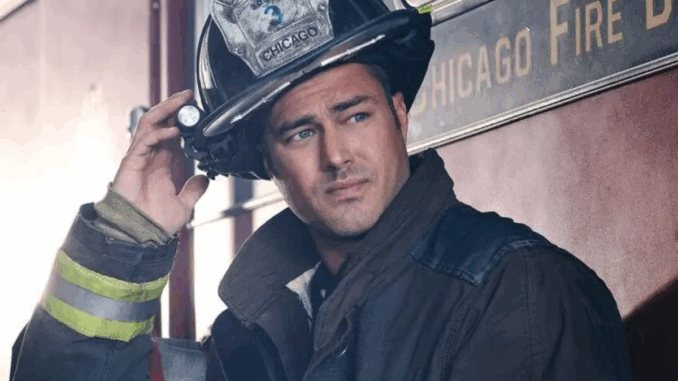
For over a decade, Chicago Fire has been a cornerstone of NBC’s One Chicago franchise, captivating audiences with its high-octane rescues and the unwavering bond of Firehouse 51. At the heart of that team, for all these years, has been Lieutenant Kelly Severide, portrayed with a perfect blend of quiet intensity and raw emotion by Taylor Kinney. Severide has become a fan favorite, a hero defined by his skill, his unwavering loyalty, and his personal struggles. But as we reflect on his long and storied journey, a remarkable detail from the show’s very first episode, the pilot, takes on a new and chilling significance: his first-ever line of dialogue happened moments before a tragic disaster that would define the entire series.
The pilot episode, titled “Pilot,” was a masterclass in establishing the show’s tone and its central conflict. It opened with a harrowing scene: a massive warehouse fire where the team is pushed to its absolute limits. In a moment of chaos and desperation, the team is forced to make a series of life-or-death decisions. It is in this high-pressure environment that we hear Severide speak for the very first time. His first line is not a grand statement or a witty retort; it’s a simple, pragmatic question directed at his best friend and rival, Matthew Casey (Jesse Spencer). He asks, “You see that?” referring to a structural weakness in the building.
The line is a perfect introduction to his character. It’s a reflection of his instincts, his training, and his unwavering focus on the job. But what makes this line so haunting is what happens immediately after. A split second after Severide’s question, a massive explosion rips through the building, trapping the team inside. The disaster that follows is not just a chaotic fire; it’s a tragic accident that costs the life of one of their own, Andy Darden. The death of Darden becomes the central conflict of the entire first season, a source of guilt and animosity between Casey and Severide, and a powerful reminder of the risks of their job.
The fact that Kinney’s very first line of dialogue happened moments before this defining tragedy is a moment of pure genius from the show’s creators. It’s a brilliant piece of foreshadowing, a subtle hint at the kind of show that Chicago Fire was going to be. It wasn’t just a show about fighting fires; it was a show about the emotional and psychological toll of the job. It was a show about the ghosts of the past and the lingering trauma of loss.
Severide’s question, “You see that?”, takes on a new meaning in this context. It’s not just a question about a structural weakness; it’s a question about the emotional and psychological weaknesses that he and Casey would be forced to confront throughout the entire series. It’s a question about the things that they could not see, the things that were hidden beneath the surface, waiting to explode.
The pilot episode was a bold statement from the show’s creators. They were not afraid to kill off a character in the very first episode, and they were not afraid to use that death to define the entire series. The death of Darden was a masterstroke of storytelling, a way to create a compelling and emotionally resonant conflict between two of the show’s main characters. The feud between Severide and Casey was not a simple rivalry; it was a conflict born out of grief and guilt, a desperate attempt to find someone to blame for an unforgivable loss.
Severide’s first line of dialogue is a perfect symbol of this. It’s a line that is both a reflection of his skill and a testament to the tragic nature of his job. It’s a line that foreshadowed a disaster that would define his character arc for years to come. It’s a line that is a reminder of the fragility of life and the immense power of loss.
For fans of the show, this detail adds a new layer of meaning to the series. It’s a reminder that the show’s creators had a master plan from the very beginning. They knew that the show’s success would not be built on its high-octane rescues, but on its emotional depth. They knew that the show’s heart would be found in the quiet moments between the characters, in the unspoken bonds of their friendship, and in the tragic circumstances that would forever bind them together.
In the end, Taylor Kinney’s first-ever line of dialogue on Chicago Fire is more than just a line. It’s a statement of purpose, a brilliant piece of foreshadowing, and a powerful reminder of the show’s enduring legacy. It’s a line that set the stage for a tragic and emotional journey, and it’s a line that we, as fans, will never be able to unhear. It’s a moment that defined a character, and it’s a moment that defined a show.